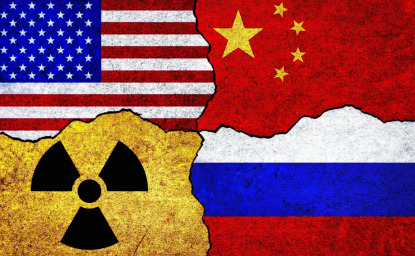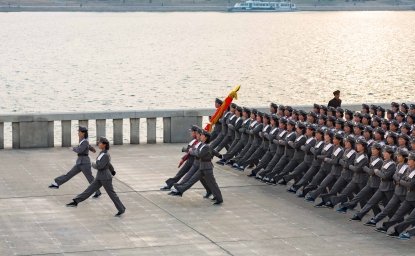North Korea’s nuclear test earlier today was neither a surprise nor an occasion for panic. Preparations at the country’s test site have been under way for some time. In the weeks since last month’s UN Security Council condemnation of Pyongyang’s December 2012 missile launch, the North Korean regime has repeatedly warned that it was prepared to conduct a nuclear test and additional long-range rocket launches. Today’s test, coupled with last December’s missile launch, simply underscores the reality that Kim Jong-un, the new North Korean leader, is more than willing to ignore international hopes that he forebear provocative steps and abide by international norms.
There is much we do not yet know about the size and nature of this latest test. It would appear that the blast, like North Korea’s two earlier tests, was less powerful than the 1945 Hiroshima bomb. It seems unlikely that the North is able to miniaturize a bomb and place it on top of a long-range missile.
Nonetheless, this latest provocation clearly constitutes a serious challenge to U.S. and international efforts to block the North from acquiring a nuclear weapons arsenal. It represents an affront to Park Geun-hye, who is to be inaugurated as South Korea’s president in less than two weeks, and who during her election campaign promised to moderate the hardline policies of her predecessor.
Pyongyang’s test is also a very public slap at China, North Korea’s sole international backer. Beijing publicly warned the North not to conduct this test and, following today’s test, expressed its “staunch opposition” to this step. More substantively, China watchers have seen indications for some time of growing Chinese impatience with its recalcitrant ally. More and more people in Beijing are tired of the North abusing China’s friendship. “We’ve been embarrassed too many times” by Pyongyang, one influential Chinese scholar confided recently.
Chinese irritation is important, for the simple reason that international action against North Korea will have little impact without China’s full cooperation. In the past, Beijing has been less than enthusiastic about international sanctions against the North, and has served as a gigantic sieve undercutting efforts to use sanctions as a way to dissuade the North from further provocations.
It is past time for China to assume the responsibilities of the great power it aspires to be. Today’s test might just be the proverbial straw that breaks the Chinese camel’s back.
The option of doing nothing in the face of this latest challenge is unacceptable. Multiple audiences – not least in Tehran -- will be closely monitoring the U.S. response. Sending a signal that the United States is indifferent to steps that carry North Korea closer to a fully operational nuclear arsenal would be the worst possible thing we could do.
Moreover, Washington’s friends in Asia will be keenly interested in seeing whether past U.S. pledges – in this case, not to tolerate a Korean nuclear program – are anything other than empty words. Potential or actual rivals, including in Beijing and Moscow, will be equally interested in determining whether U.S. talk of consequences is followed by concrete and meaningful action, and will draw conclusions about the nature of the U.S. “pivot” or rebalance toward Asia on the basis of what they see.
There may be nothing we can do to stop North Korea’s pursuit of a nuclear weapons capability. North Korea has shown itself remarkably impervious to both international carrots and sticks. Even so, we must try. And so must Beijing.
Author

Former Director, Asia Program, Woodrow Wilson Center; Former Public Policy Fellow, Woodrow Wilson Center
Explore More
Browse Insights & Analysis
US Inaction Is Ceding the Global Nuclear Market to China and Russia

Civil Society and Nuclear Risk Reduction

